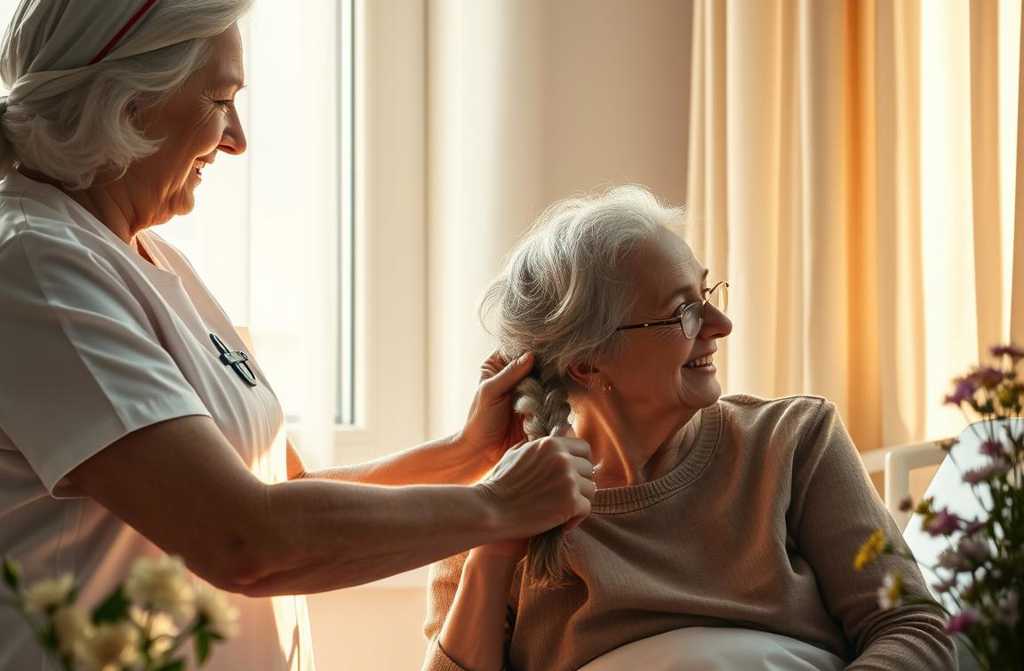“You’ve always been a burden,” the husband said in front of the doctors.
“Emily, love, leave those drips for nowyouve been at it for three hours! Go home and finish in the morning,” Dr. Harrison, head of the ward, stood in the doorway, watching the elderly nurse methodically sorting through vials. “Your William must be waiting.”
“My William stopped waiting thirty years ago, and hes just fine,” Emily chuckled, but her hands never pausedchecking, sorting, arranging. “Dont worry, Dr. Harrison, Ill be done soon. Just want everything ready for rounds.”
The doctor shook his head but didnt argue. After forty years at St. Marys Hospital, Emily had earned the right to work at her own pace. Her precision and dedication were legendary on the ward.
“Oh!” she gasped suddenly. “That reminds meMrs. Collins in Room Seven asked for those drops. The sleeping aid Dr. Bennett prescribed.”
“Then see to it and go home,” he said sternly. “Or Ill have William calling me tomorrow, accusing me of overworking you.”
Emily laughed. “He wont. Never learned how to use a phone. Says hes too old for ‘newfangled nonsense.'”
Once Dr. Harrison left, she finished the drips and headed to Room Seven. A frail woman in her fifties lay by the window, her blonde hair streaked with premature silver. Though illness had worn her down, her eyes held quiet dignityand hidden sorrow.
“Margaret, dear, you wanted to see me? Im so sorry, I got caught up,” Emily said, perching on the edge of the bed. “How are you feeling?”
“Better, thank you,” Margaret whispered. “The wheezings gone. But I cant sleepjust thoughts, spinning all night…”
“Nerves,” Emily nodded. “Your bodys healing. Here, Dr. Bennetts dropstwenty in half a glass of water before bed.”
“Thank you,” Margaret took the bottle. “Youre so kind. Ive met few people like you.”
Something in her voice made Emily study her closely.
“Is everything all right? Not the illnesssomething else. Does anyone visit?”
“My daughter comes when she can,” Margaret said. “Shes lovely, but lives up north. And my husband…” She hesitated. “Hes busy. Work, you know.”
Emily frowned but held her tongue. Years in the wards had taught her to hear what went unsaid.
“Let me brush your hair,” she said suddenly. “Its beautiful, but tangled. Youre too weak to manage it, and heaven knows theres little comfort in hospitals.”
Without waiting, she fetched a comb and began gently working through the knots. Margaret stiffened at first, then relaxed under the steady, soothing strokes.
“My mother used to do this,” Margaret murmured. “Said it was the best cure for sadness. I did the same for my daughter when she was small. But my husband…”
“What about him?” Emily prompted softly.
“Called it nonsense,” Margaret said after a pause. “Said long hair was impractical with my back problems. That I should cut it short. But I kept it… one small rebellion.”
“Good,” Emily nodded. “Men dont understand. Hairs a womans strength.”
She finished combing and began braiding.
“Tell me about yourself,” Margaret asked. “You mentioned a husband…”
“Oh, just William and me,” Emily smiled. “Our sons in Canadawe see the grandchildren on video calls once in a blue moon. Forty-five years married, can you imagine?”
“Forty-five…” Margaret echoed. “Peter and I wouldve been thirty-two this year. If I make it.”
“Dont say that!” Emily scolded. “Youre healing well. Youll bounce grandchildren on your knee yet.”
“Peter doesnt want grandchildren,” Margaret said quietly. “Says Im trouble enough as it is. That theyd be more hassle.”
Emilys hands stilled. Something in Margarets tone made her chest tighten.
“Margaret,” she said carefully, “has your husband always… spoken to you like this?”
A long silence. Then a shuddering breath.
“No. When we were young, he was different. Brought flowers, told me I was beautiful. Then… I got ill. Slipped disc, chronic pain. Had to quit my job. And Peter… changed. Snapped about medications, complained I couldnt keep house like before.”
Emily squeezed her shoulder.
“First I thought it was stress. Then I hoped things would improve when our daughter left for uni. But they only worsened. I became… a burden. His word. ‘Youre nothing but trouble, Margaret. A drain on time and money.'”
“The nerve!” Emily burst out. “And you put up with this?”
“What choice have I?” Margaret shrugged. “Where would I go? No one hires someone with a bad back. My pensions barely enough for groceries. My daughters starting her own lifeI wont saddle her with this.”
Emily finished the braid and faced her squarely.
“Margaret, love, this isnt living. A husband should lift you up in sickness, not kick you down. Thirty-two years togetherdoesnt he see you didnt choose this?”
“Peter says I did,” Margaret looked away. “Claims I brought it on myselfbad posture, poor diet. And the costs… I skip medications to save. But the surgery…”
“Wait,” Emily frowned. “The NHS covered your operation.”
“Yes, but scans, the brace, rehab… Weve a mortgage, car payments…”
“Let me guessthe cars his?”
“Of course,” Margaret gave a joyless smile. “He needs it for work. The breadwinner, after all.”
Emily opened her mouthbut a young nurse appeared.
“Emily, your husbands on the phone at the desk.”
“William? On the phone?” She blinked. “Must be an emergency. Margaret, dont forget those drops.”
At the desk, Dr. Bennett was speaking to a well-dressed man in his fiftiespolished shoes, Rolex, the commanding air of someone used to deference.
“need a timeline,” the man was saying. “When can she manage alone? I cant take weeks off work.”
“Recovery takes time,” Dr. Bennett said patiently. “Shell need help bathing, moving”
“Hire a carer? Thats expensive. Our daughters in Edinburgh, and weve no other family.”
Emily answered the phone, half-listening.
“Bill? Whats wrong?”
“The boilers acting up, love. Gas engineer needs the homeowner present.”
“Ill be home soon. Put the kettle on, Im starved.”
Hanging up, she caught the mans next words:
“needs to push harder. Shes always lacked motivation.”
Dr. Bennett stiffened.
“Your wife had major spinal surgery. Shes doing exceptionally well.”
“Just take me to her,” the man snapped.
Emily followed, uneasy.
In the room, Margaret was struggling to sit up. Seeing her husband, she froze.
“Peter? You came?”
“Clearly,” he stayed by the door. “Your doctor says youll be lounging here indefinitely.”
“Im doing my exercises,” she whispered.
“Not well enough,” he sneered. “Do you even consider the costs? The time I waste ferrying your things? The medicines you constantly demand”
“I dont demand!”
“shouldve seen a doctor sooner. But no, you penny-pinched until it became an emergency. Typical.”
Dr. Bennett cleared his throat.
“Spinal conditions often”
“Ive known her thirty-two years,” Peter cut in. “Always procrastinatingwork, parenting, now health. Always consequences.”
Margaret stared at her lap, fingers twisting the sheet.
“Peter, please… not now.”
“Please what?” His voice turned icy. “Youve always been dead weight. First postpartum depression, then migraines, now this. Our marriage? Me, carrying you.”
Silence.
Dr. Bennetts jaw tightened. Emily stepped forward.
“Sir, this is a hospital. Your wife just had surgery. Show some respectif not to her, then to this place.”
Peter turned, eyeing her with disdain.
“And you are?”
“Emily Carter, senior nurse. Ill ask you to leave if you cant speak civilly.”
“This is my wife”
“And our patient,” Dr. Bennett interjected. “Youll return during visiting hours, or not at all.”
Peter glared, then looked at Margaret.
“Fine. But rememberno carers at home. Sort yourself out.”
The door slammed behind him.
Margaret wiped her eyes but forced a smile.
“Hes not usually like this. Just stressed.”
“Margaret,” Dr. Bennett said gently, “does he often speak to you this way?”
“Oh no! Its just… work pressures, and my surgery…”
“Thats no excuse,” Emily said firmly. “No man should speak to his wife like thatleast of all when shes ill.”
“Ive nowhere to go,” Margaret whispered. “I depend on him completely.”
“There are shelters,” Dr. Bennett said. “Support services. Thisthis is abuse.”
“Abuse? Hes never hit me. Just words… and disappointment.”
Emily took her hand.
“Dear, thirty-two years shouldnt look like this. My Bill and Ive had quarrels, yesbut never cruelty. Never blame during illness.”
“But what can I do?”
“First, heal,” Dr. Bennett said. “Well figure out the rest.”
Before leaving, Emily lingered.
“My Bill was just as proud when we met. Thought the sun rose for him alone. Then I got pneumoniabad. He stayed up nights, made soup, changed compresses. Thats when I knew he was a real man. Not one for pretty words in health, but one who stands by you in sickness.”
“Youre lucky.”
“Not luck,” Emily corrected. “Choice. And you still have choices, Margaret. Not for a new lovebut for a new life. Without scorn. Without shame. Think on that.”
At home, Emily told Bill everything. Her husbanda stocky man with a face like weathered oaklistened, shaking his head.
“Bastard,” he muttered. “How do men like that live with themselves?”
“I dont know,” Emily sighed, pouring tea. “But nights like this, I thank God for you.”
Bill reddened, scratching his stubble.
“Ah, come off it. Im just an old fart.”
“The best old fart,” she smiled, squeezing his hand.
Meanwhile, in Room Seven, Margaret lay awake despite the drops. She thought of Peters words. Of thirty-two years as a burden. Of how many more she might endure. And for the first time in years, a quiet resolve stirredthat perhaps it wasnt too late to choose differently.
For sometimes, the bravest thing a person can do is walk away from the life thats breaking them, and dare to believe they deserve better.







